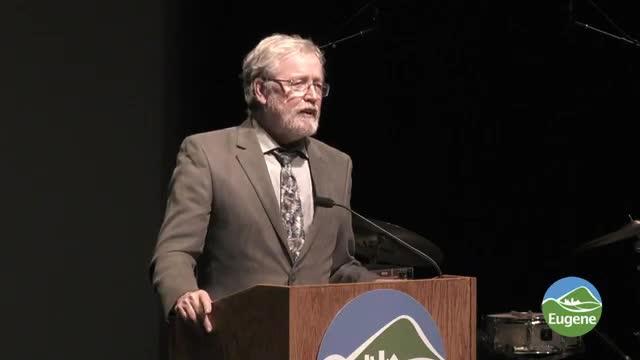State of the City: Knutson highlights housing, homelessness, shelter gains, climate funding and childcare
Get AI-powered insights, summaries, and transcripts
Subscribe
Summary
In her State of the City address, Mayor Karen Knutson reviewed 2024 accomplishments — shelter expansion, housing investments, climate and renewable grants, childcare slots — and several statistics on homelessness and public‑safety and outreach programs.
Mayor Karen Knutson used the State of the City address to summarize the city’s 2024 accomplishments and to underscore continuing challenges on homelessness, shelter and housing.
Knudtson (sic) said Eugene supported nearly 700 shelter spaces in 2024 and highlighted partnerships that led to new affordable rental units for veterans, rehabilitated affordable apartments and Homes for Good breaking ground on two buildings after a $3,600,000 city contribution. The mayor also credited an Eugene Shelter Consortium formed by five shelter providers and the city’s homeless services team for coordinating shelter services.
Speaker Dan Bryant, executive director of Square 1 Villages, said December’s "homeless by name" count was the highest December on record in the five years the community has tracked that metric but noted that the year‑over‑year increase in 2024 was about 1%, compared with an 18% increase nationwide. "It’s still an increase," Bryant said, "but the fact that we have hopefully leveled off is a hopeful sign." He described Square 1’s work combining a community land trust with limited‑equity co‑ops and said his organization has multiple projects in development.
Knudson also highlighted climate and energy awards: the city secured roughly $10,600,000 in federal and state funding for renewable energy projects, energy efficiency upgrades in city facilities and community resilience work. She said the Climate Action Plan 2.0 is about 61% implemented and noted new public‑space and public‑safety efforts funded through the Community Safety Payroll Tax, including embedding a Lane County behavioral health professional for downtown emergency responses.
The address highlighted other local accomplishments in 2024: the launch of an online growth monitoring dashboard, 80 new childcare slots created through an Early Child Care Grant Program in partnership with Onward Eugene and Lane Community College, and public‑works investments on Martin Luther King Jr. Boulevard, Howard Avenue and High Street to improve walking and biking safety.
Knudson noted transportation and technology changes, including My PD Connect, which she said recorded about 8,000 reports in its first year. She also mentioned the riverfront housing project, the upcoming Riverfront Park Plaza opening and a $1,200,000 grant supporting mountain bike trails and a skills park in Suzanne Arly Park funded in part by the 2018 Parks and Recreation Bond.
The mayor framed homelessness as a housing problem that also requires shelter and cited Lane County’s results from state funding rounds — stabilizing roughly 1,900 people in housing, permanently housing 244 households and creating more than 300 emergency shelter beds — as evidence of broader regional efforts. Knutson said she will advocate at the state legislature for funding to stabilize shelter capacity.
Several community awards and recognitions were presented as part of the program, including the Bold Steps Awards retrospective and community service awards to Nancy Bray (Friendly Area Neighbors Equity Action Team), Dan Bryant (Square 1 Villages) and Guadalupe Quinn (immigrant and social justice advocate). Those presentations included descriptions of neighborhood mural projects, community land‑trust work and decades of organizing and advocacy.
Many of the programs the mayor described are ongoing partnerships among city departments, county agencies, nonprofit providers and state and federal funders. Knutson did not propose new ordinances during the address; she framed several priorities for the coming year and encouraged continued interagency and community collaboration.
